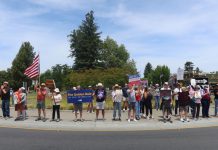Community workshop to be held at undetermined date
Following an outpouring of opposition from the community, the Cloverdale City Council voted unanimously to postpone its decision regarding Cloverdale’s water and sewer rate increase in favor of being able to spend more time engaging the community on alternatives to such a significant rate hike.
Mayor Gus Wolter was absent from the Nov. 11 meeting.
The proposed increase in the city’s water and sewage rates was set to increase the rates significantly more than ratepayers are used to — a 13% water increase and 17% wastewater increase on Jan. 1, with the same increase happening on July 1, 2021 and on each subsequent July 1 through 2024 — something that city officials said is needed to help start capital improvement projects related to the city’s water and wastewater systems. In the past, the cost of such projects haven’t been factored into the city’s rates and annual increases have been around 3% per fiscal year.
The city has approximately 3,300 utility connections and there were potentially over 1,000 responses submitted in opposition to the increases.
If written protests against the proposed water and/or sewer rates were received for a majority of the parcels subject to the proposed rates, the city would not be able to impose the proposed rates.
According to public comment during the public hearing, included in the individual parcel opposition to the water rates was a unanimous decision by the board of directors of Clover Springs to formally oppose the rate increases.
Both written and spoken public comment during the discussion emphasized an overwhelming opinion from community members that they felt blindsided by the city’s notice about the water rate increases. One community member pointed out that information about the proposed increases was on the fifth page of a community update, where some people may not have noticed. Other people expressed a desire to have clearer communication from the city — potentially through regular emails or more frequent mailed notices.
“Despite the work of staff over the preceding three months in working with our financial team to bring forward a financial plan that addresses the financial viability of both our water and sewer enterprises, staff really recognizes that the community has expressed quite a bit of concern about the proposed rates needed to support our utilities,” Kelley said.
Rather than continue with the increase as suggested, City Manager David Kelley recommended that the council push off the adoption of the new rate schedule to instead allow continued time for community input and engagement.
“I think it’s important to have further conversations with members of our community and garner their input and ultimately come back with some additional scenarios for the council to consider,” Kelley said, noting that the city could hold a public workshop as soon as January.
All council members in attendance supported the plan proposed by Kelley and echoed a sentiment that encouraged community members to stay engaged in the rate setting process.
“I think it’s a really good idea to step back, not do anything with this, and just let the public have some input into public meetings,” Councilmember Mary Ann Brigham said. “We all know we’re going to have a little bit of a rate adjustment, but I think this is a great outcome. The public has really stood up this time and made a comment, and I hope, I really hope, that the public stays more engaged.”
“The public workshop will provide an opportunity for the community to learn more about the financial rate study including the financial obligations for ongoing operation and maintenance, debt service and capital improvements while maintaining prudent financial reserves,” Kelley said in a statement. “The workshop is intended to allow the community to provide input and comments on the study and rate adjustments necessary to fund ongoing operations and capital improvement projects to support water and sewer services for our residents.”
The date for the community workshop will be announced in the near future.
Deferred Maintenance
One of the roots of the city’s initial proposed increase in water rates is a mounting list of deferred maintenance capital improvement projects.
“Really we want to have a conversation with the community about these important investments,” Kelley said.
One of the reasons for the water rate increases was a list of capital improvement projects to the city’s water system that have been deemed necessary, mandated or desirable. Among the projects on the city’s capital improvement plan that begins Fiscal Year 2021-22 and ends Fiscal Year 2030-21 is the $1.27 million rehabilitation of the Cherry Creek Reservoir and the $1.587 million rehabilitation of the Ritter Reservoir, replacing $9.183 million worth of sewer line, among others.
What’s critical about incorporating the cost of improvement projects into water and wastewater rates, Kelley said in an October interview with the Reveille, is trying to address years of deferred maintenance, brought on by the Great Recession as well as reduced staff and revenue.
“A lot of projects got deferred,” Kelley said. “Unfortunately, you can only defer some of these projects for so long before they in essence become critical. If we don’t do this, if we don’t start building into our rates the cost for these projects, it could put us in a detrimental position relative to funding some of these improvements.”
During the public hearing, community members also urged the city to stop putting off maintenance projects, which can lead to increased cost to the city farther down the road, therefore increasing the cost to ratepayers.
One challenge that Cloverdale has, Councilmember Melanie Bagby noted, is that it maintains its own water system which can be “incredibly difficult” for smaller cities with under 10,000 people.
“We’re not part of Sonoma Water. We have our own water treatment plant and we have our own sewage treatment plant. It’s getting more and more expensive for small rural cities like us to maintain this system when we keep our population suppressed and we don’t have as many ratepayers spreading out the cost,” Bagby said.









